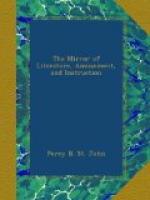Dripping Rock, in India.—Sansadhara or the dripping rock, is a singular phenomenon, situated at the head of a dell, through which a rapid stream runs, between two lines of hills towards the valley of the Dhoon. It is an overhanging rock, about 50 feet high, through which water pours from above, in innumerable little streams, like a perpetual shower of rain! The never-abating action of the water has worn the rock into many fantastic shapes; and, crusting round the moss and fibres of the roots of trees, has given to it almost the appearance of a spar cavern. In several places the water has worn little reservoirs for itself, which are always full. It is cool, clear, and pleasant to the taste.—Captain Skinner.
Catching Wild Ducks, &c. in India.—In the lower parts of Bengal, wild ducks, widgeon, and teal, are often taken by means of earthen pots. A number of these pots are floated amongst them in the lakes where they abound, to the sight of which they soon become reconciled, and approach them fearlessly. A man then goes into the water up to the chin, with one of these pots over his head, in the centre of which two small holes are made for him to see through; and when he gets into the midst of the birds, he pulls them by the legs under water, fastening them to a girdle round his waist.—T. GILL.
Hampden.—Lord Nugent, in his Memorials of John Hampden, relates the attack of Rupert’s troops upon the village of Chinnor. A local tradition of the affair has been related to me by an old inhabitant. In the room of a house, until lately occupied as a boarding-school, two of Rupert’s soldiers are said to have evinced great brutality. On entering the house, they demanded a flitch of bacon, hanging up in the room; one of them held up a child which he had taken from a cradle, and crossing a sword over it, threatened its immediate destruction if their demands were not instantly complied with. There appear to have been sharp hostilities in the vicinity of Chinnor, and more particularly on the hills, as military buttons, sword handles, &c. and other vestiges of war are frequently found there.—W.H.
Parody on Scott’s Lines “Breathes there the Man,” &c.
Breathes there a cit, with taste so dead,
Who never to himself hath said,
“This haunch surpasses
all the rest;”
Whose mouth hath ne’er within him
burn’d,
Whene’er his footsteps he hath turn’d
From home, to Guildhall’s
civic feast?
If such there breathe, go mark him well—
For him no portly paunch can swell;
Large though his shop, his trade the same,
Boundless his wealth as wish can claim,
Despite his shop, his trade, his cash,
The wretch who knows not ven’son
hash,
Living, shall forfeit civic fame,
And dying, shall descend with shame,
In double death, to Lethe’s pools,
Despis’d by epicures and fools.
REX.




